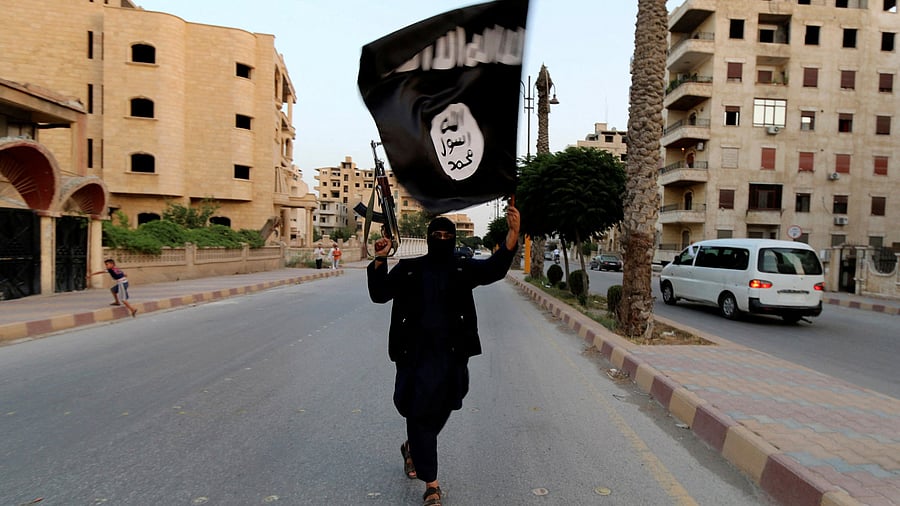
FILE PHOTO: A member loyal to the Islamic State in Iraq and the Levant waves an ISIL flag in Raqqa, Syria June 29, 2014.
Credit: Reuters Photo
The Islamic State has claimed responsibility for two bomb explosions in Syria, the first time the extremist group has directly targeted the new government since it took over in December, a war monitoring group said.
In two statements posted online Thursday and reported by the SITE Intelligence Group, the Islamic State group claimed that bombs laid by its members had killed and wounded government soldiers and allied militia members.
The Syrian government did not report any Islamic State attacks in the area but announced that it had conducted two raids against Islamic State operatives in the Damascus area in the past week.
The Syrian Observatory for Human Rights, a Britain-based monitoring group, reported that one person was killed and three members of the Syrian army's 70th Division were wounded when a patrol was hit by a remote-controlled land mine in the east of Sweida province Wednesday. The man killed was accompanying the government forces, it said.
The two attacks claimed by the Islamic State took place in the southern province of Sweida, where the group has not been active for the best part of a decade. But the government has struggled to establish security in the province, which is effectively controlled by the Druze minority. Sectarian clashes between local militants and pro-government forces in the province killed more than 100 in late April and early May.
The Islamic State, which controlled large parts of Iraq and Syria a decade ago until US and allied Syrian forces largely defeated it, has continued a low-level insurgency in eastern Syria since 2019. But it has shown a renewed vigor since the fall of dictator Bashar Assad in December, plotting attacks even in the capital, Damascus, and claiming responsibility for a car bombing among other attacks in eastern Syria.
The United States increased the numbers of its troops in Syria to 2,000 in the immediate aftermath of the removal of Assad's government because of the threat of an Islamic State resurgence. U.S. intelligence officials have said that the group could try to free some 9,000 of its followers detained in prisons in northeastern Syria, and seek to exploit divisions in the country and weaknesses in security of the new government.
Syrian government forces, working on intelligence provided by the United States, successfully thwarted eight attacks in Damascus in recent months, US officials have said.
Among the plots averted was a plan to attack a Shiite shrine, according to Mouaz Moustafa, who leads the Syrian Emergency Task Force, an American nonprofit group working for democracy in Syria.
The targeting of government forces with roadside bombs is a new development. It comes amid a campaign of heightened messaging in Islamist circles against President Ahmad al-Sharaa, who formerly led a group affiliated with al-Qaida but has publicly distanced himself from terrorist groups as he has sought international acceptance for himself and Syria.
The Islamic State labeled his government an "apostate regime" in its statement. Others have criticized al-Sharaa for not opposing Israel and for meeting with President Donald Trump.
A prominent former al-Qaida ideologue, Abu Muhammad al-Maqdisi, in a statement distributed on jihadi chat groups last week, as reported by SITE, declared that al-Sharaa should be excommunicated for his failure to enforce Shariah law.
But al-Maqdisi advised against directly attacking al-Sharaa's government unless the rebel groups were strong enough to overthrow the government, since, he said, small disruptive attacks would only play into the hands of enemies of Islam.